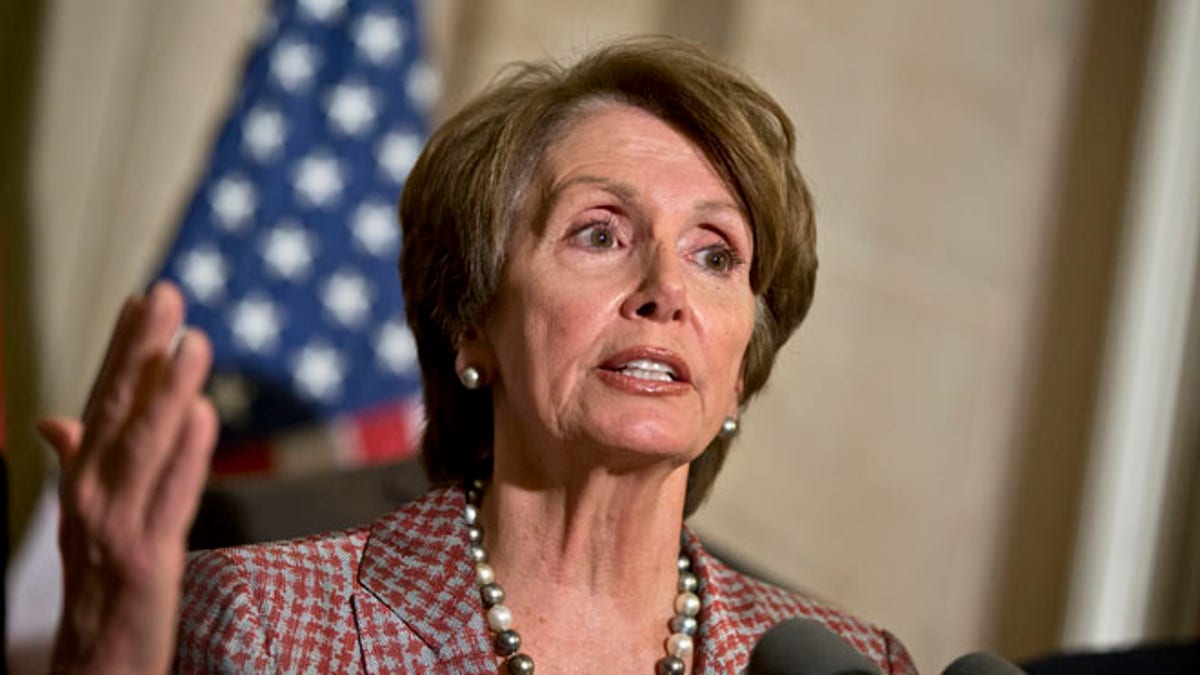
Nov. 29, 2012: House Minority Leader Nancy Pelosi speaks to reporters at the Capitol in Washington. (AP)
Democratic leaders are giving the cold shoulder to Republicans' counter-offer in fiscal crisis talks -- and perhaps nothing captures the ongoing wheel-spinning more than House Minority Leader Nancy Pelosi's procedural move Tuesday afternoon.
Amid the deepening stalemate on the Hill over how to avert a wave of tax hikes and spending cuts starting next month, Pelosi pushed Tuesday for a vote on the Senate-passed bill that would extend current tax rates for middle-class families while letting rates rise for the top 2 percent. Republicans, who want to preserve the rates for everybody, have opposed this -- and Pelosi's effort is unlikely to succeed for several reasons.
First, she would need to find 218 votes, including 27 Republican votes. And even if she is somehow able to muster that bipartisan support, congressional rules could delay a vote until next year -- by which point the shelf life on the procedural maneuver Pelosi is trying to employ would have expired.
The activity on the House side Tuesday underscores how little progress is being made toward a deal. Meanwhile, both the Obama administration and House Republicans have put a plan on the table, but each side is rejecting the other's.
House Republican leaders unveiled a plan Monday that would agree to $800 billion in "revenue through tax reform" over the next 10 years. It marked a significant step for House Republicans, some of whom opposed such increased revenue before last month's election.
- Amid violent insurgency, UN’s costly Congo peacekeepers charged with making a bad situation even worse
- Syria moves chemical weapons, White House warns of crossing ‘red line’
- Holder chief of staff targeted by Republicans in ‘Furious’ scandal to leave post
- Senate approves Obama’s pick for Afghan commander
- Warning: The UN is coming for your Internet
- Judge temporarily blocks California gay conversion therapy law
However, the number is half the $1.6 trillion in tax hikes that Obama proposed. And the two sides are likely to continue to butt heads over the issue of an increase in tax rates for the top 2 percent of earners.
The White House has insisted on raising those rates next year, while Republicans favor raising revenue instead by closing deductions for top earners and other measures. They reiterated their opposition to tax-rate hikes in the plan Monday.
The White House almost immediately criticized the Republicans' offer.
"The (proposal) does not meet the test of balance," Communications Director Dan Pfeiffer said. "In fact, it actually promises to lower rates for the wealthy and sticks the middle class with the bill. ... While the president is willing to compromise to get a significant, balanced deal and believes that compromise is readily available to Congress, he is not willing to compromise on the principles of fairness and balance."
Senate Democratic Leader Harry Reid chimed in, saying "it is time for (Republicans) to get serious about forging a balanced approach."
Republicans have the same to say about Obama's plan.
In a letter to Obama on Monday, Republicans said they "cannot in good conscience agree" to the president's proposal, which was unveiled last week by Treasury Secretary Timothy Geithner, calling it "neither balanced nor realistic."
"Regrettably, the proposal he outlined on behalf of your administration contains very little in the way of common ground," they wrote, particularly assailing the administration's push for more stimulus spending at a time when Washington is supposed to be trimming the deficit.
The Republican counter-offer includes $800 billion in revenue through tax reform; $600 billion in health savings; $300 billion in other entitlement savings; and another $300 billion in savings elsewhere in the discretionary federal budget. The plan would hike the Medicare eligibility age and lower cost-of-living adjustments for Social Security.
Republicans estimate the plan would save $2.2 trillion over 10 years -- or $4.6 trillion if one uses the accounting methods employed by the White House. Those methods boosted the White House estimate for its own plan to $4 trillion, but Republicans say the methods are spurious.
In the letter signed by House Speaker John Boehner and other Republican leaders, the lawmakers called the plan an "imperfect, but fair middle ground."
"If you are agreeable to this framework, we are ready and eager to begin discussions about how to structure these reforms so that the American people can be confident that these targets will be reached," they wrote.
Republicans were fuming last week over the president's call for $1.6 trillion in tax hikes -- four times the value of his proposed spending cuts. Boehner said he was "flabbergasted" by the plan.
The administration's latest proposal includes roughly $600 billion in spending cuts. Those cuts, however, would be offset by $200 billion in proposed stimulus and other spending programs. The multi-year stimulus program would include at least $50 billion in fiscal 2013 alone; the administration also wants an extension of unemployment aid. And, in what one House Republican source called a "pipe dream," the administration called for effectively implementing a permanent increase in the debt limit.




